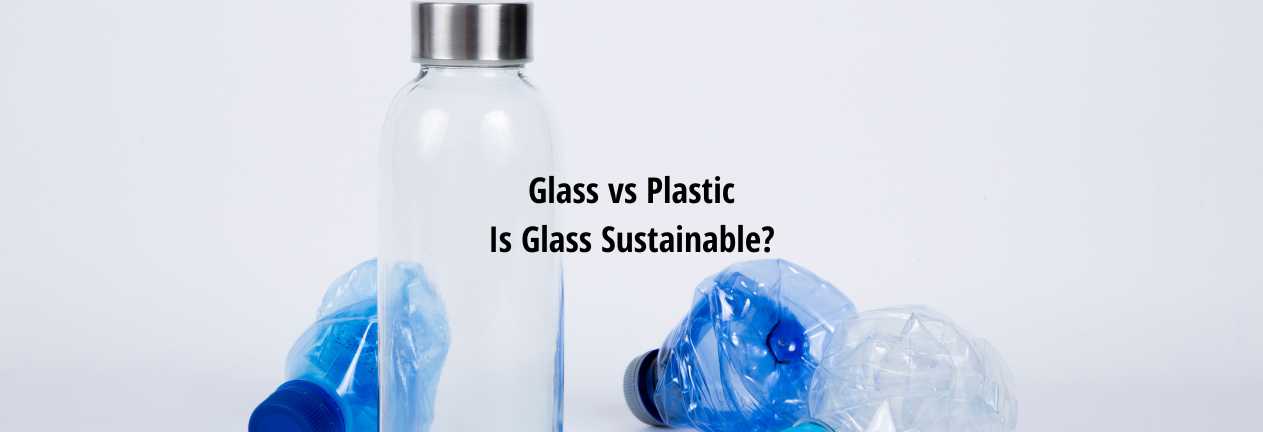Plastic has a terrible reputation among environmentalists and concerned consumers. For consumers, using less plastic ranks as the number one goal to help the planet. In fact, the surge of mainstream awareness over the pollution caused by single-use plastics has led to a worldwide decline in plastic bottle sales. Meanwhile, we’ve seen a hike in people buying glass bottles because it’s been seen as more environmentally friendly and on-trend. In this article on glass vs plastics, we will feature the pros and cons of both products. If you’re anything like me, you’ve probably heard countless times that plastic is bad and glass is good for the environment. Maybe you also have friends who have rows of glass jars filled with food staples lining the pantries. Whether the obsession with glass containers is really that much better for our planet or whether plastic use damages the environment, we’ve decided to find out more about glass vs plastics.
THIS POST MAY CONTAIN COMPENSATED AND AFFILIATE LINKS. MORE INFORMATION IN OUR DISCLAIMER
What to Know About Glass for Storage
Many Environmentalists view glass as more sustainable than plastics. For starters, glass bottles and containers are far more durable, and can last for many years, making them an excellent choice for those needing a reusable container for their liquids. You can even quickly sterilize glassware in boiling water, making it so reusable and easier to clean.
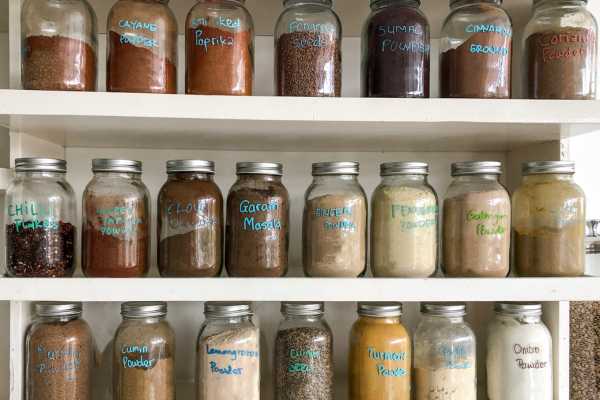
Furthermore, glass does not contain any of the potentially damaging chemicals that some plastic containers do. Many use plastic bottles that contain BPA, and this substance can cause disruption to natural hormones in the body. Glass, however, lends itself well to recycling, further making glass environmental-friendly. Seems too perfect? Continue reading to help you conclude between glass vs plastics.
APRIL SPECIAL OFFER:
Get 10% off all Seeds from Suttons here
Want Fruit Plants and Trees? You’ll get 10% off all Fruit Plants and Trees with Suttons. Get the deal here.
What is Glass Made From
Glass is from liquid opaque sand. Manufacturers create glass with natural and abundant raw materials (sand, soda ash, and limestone), which they melt at high temperatures to form glass. At high-level temperatures, glass is structurally similar to liquids, but the glass structure behaves like solids at a lower temperature.
Is Glass Biodegradable
Non-biodegradable materials like glass do not decompose quickly. Glass bottles and containers stay intact in the environment for many years. Glass bottles are not biodegradable because they break down very slowly. But because glass is entirely made out of sand, you can simply break down the glass by melting it.
Pros and Cons of Glass Usage
People have been packaging products in glass containers for countless years now. From rum bottles to lunch food, the type of products packaged in glass is virtually endless.
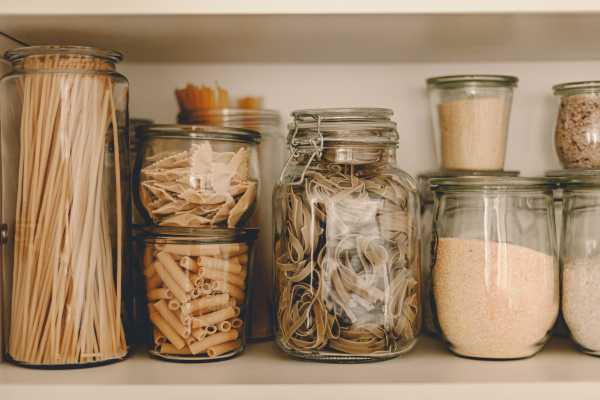
Having been part of human existence for so long, glass has a long history of use for consumers. However, glass has its pros and cons in our environment too.
Pros of Glass as a Storage Mechanism
- Glass is durable and can last for years
- Glass is easily sterilized and cleaned in boiling water and easy to remove oil/grease
- Glass doesn’t contain any potentially harmful chemicals
- Glass is very versatile
- Glass is 100% recyclable – Our guide on how to recycle glass jars is here
Cons of Glass as a Storage Mechanism
- Glass is not as convenient as plastic, and it’s far heavier and easier to break
- Most glass isn’t actually recycled
- Glass takes a very long time to decompose in the environment
- Creating glass is also an emission-heavy process
APRIL SPECIAL OFFER:
Get 10% off all Seeds from Suttons here
Need Fruit Plants and Trees? You’ll get 10% off all Fruit Trees and Plants with Suttons. Get the deal here.
What to Know about Plastic as a Storage Medium
For the last 45 years or so, plastic has been overtaking glass as the standard container for food, especially for take-outs, in restaurants and to preserve food. Plastic surpassed glass in liquid packing in 2021. It’s easy to see why. Plastic bottles and containers are lighter, reducing transportation, overhead costs, and other expenses for manufacturers.
While some people think that glass is better than plastic because of its Eco-friendliness, plastic has a fair share of supporters, too, because some of it is now recyclable, its lighter to transport and convenient. Because glass is fragile, it tends to shatter and create potential damage and messy situations easily. While glass will break, plastic can deform and bounce back into shape if dropped; thus, it is safer than glass materials.
What is Plastic Made From?
Manufacturing plastics starts with oil and natural gas. These raw materials are converted into monomers and then chemically bonded to create long chains called polymers. These polymers are the plastics you see in the form of water bottles, food containers, and many more. To obtain the crude oil and natural gas required to create plastics, we must head for the Earth’s crust.
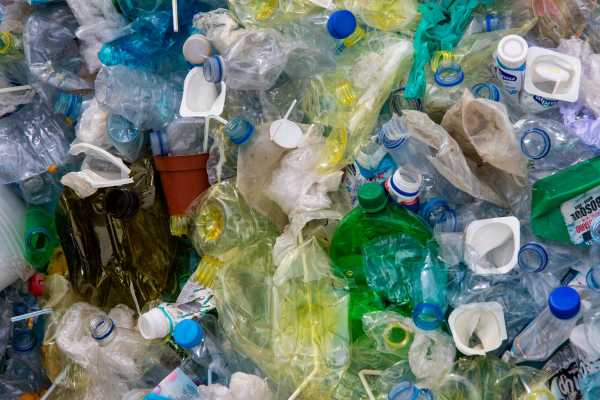
There’s also another alternative to drilling natural resources from the Earth’s crust to make plastics. Bio-based plastics are more sustainable, and they are made from renewable materials such as vegetable fats, vegetable oils, carbohydrates, starch, bacteria, and other biological substances. This alternative material used to develop plastics is the future of plastic.
Is Plastic Biodegradable
All plastic is biodegradable, mostly it just takes a REALLY long time, give or take 450 years. However, traditional plastic (PET) doesn’t readily biodegrade or decompose because it’s made with chemicals that the bacteria that would decompose it cannot consume, making it hard for these plastics to decompose. Learn about biodegradable plastic left under soil experiments here.
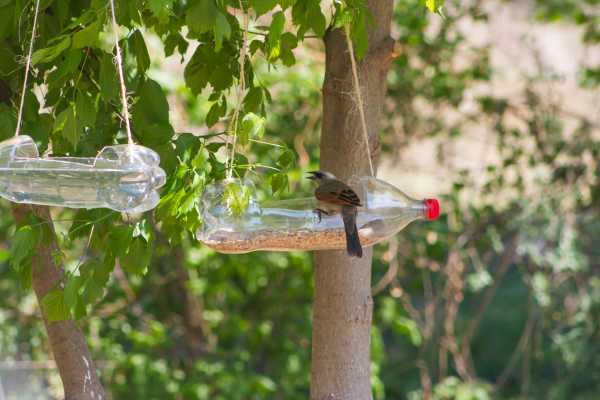
There are also microplastics – just because you can break plastics into tiny fragments or powder does not mean the materials will ever return to the environment.
Pros and Cons of Plastics for Storage
The benefits of plastics are unmatched by any other material, says the Plastics Industry Association. It is light-weight, easily shaped, strong, and inexpensive. Also, plastic’s ability to guard against contamination makes them useful in sterile medical environments such as health centres. Plastics are a valuable material because of their many benefits and the multiple ways it makes human life convenient. But certainly, its benefits also have drawbacks.
Pros of using Plastic for Storage
- Plastics are much lighter and more durable than glass
- Plastics are convenient
- Plastics are cheap
- Plastics have multi-purpose
Cons of Using Plastic for Storage
- Big carbon footprint
- Only 9 per cent of plastics are recycled
- Recycling plastic costs high-emissions
- Traditional Plastic never truly breaks down.
Glass vs Plastic
Glass is seven times heavier than plastic at the same volume, making it more expensive to transport. It’s also fossil fuel intensive to move from one place to another. Glass also uses more natural resources during production than plastic does despite glass being created from a more renewable resource than plastic. Additionally, glass is more prone to breaking than plastic and is very dangerous to clean up.
On the other hand, plastic has a small carbon footprint for transportation, but it’s tough to overlook the giant carbon footprint of manufacturing plastics. Plus, the plastic that doesn’t end up in a recycling bin can be a massive pollutant in our environment, killing wildlife and contaminating ecosystems.
So, what’s the solution for a more sustainable lifestyle? What do you think is more sustainable, glass vs plastic bottles? The best thing everyone can do is reduce our reliance on anything single-use as much as possible. Reuse what you already have rather than purchasing over and over.
There’s more on living a sustainable life in your home and garden in our guides here
- The best eco dish sponges and scrubbers
- Eco-friendly dishcloths and tea towels
- Which is best for food storage? Plastic or Silicone?
- Looking for ideas? Here’s how to recycle glass jars
- The Best Plastic-Free Freezer Storage Guide.
Let’s Grow Cook Recommends..
Whether you’re buying seeds, seedlings, plants, propagation gear, gardening tools or items for the kitchen, here are our favourite suppliers.
Best for Seeds & Plants
- Suttons: – OFFERS on Seeds, Sets, Plants and Gardening Tools
- Crocus’s – seeds, plants, seedlings and help with propagation
- Amazon – seeds, plants, and growing kits – check options here
Best for Pots, Containers, Gardening Tools & Compost
- Garden Growing Accessories – The latest offers from Suttons
- Crocus – the UK’s largest garden supplier – Crocus – has great deals on pots, containers, tools & compost.
- Amazon – a superb selection of pots, containers, tools & compost – order here
- Waltons – the UK’s best sheds and garden buildings – options here
Best Tools & Gadgets for the Kitchen & Cooking Aids
- Rediscover the simple pleasures of home cooking with SimplyCook – Try your first box for free (just pay £1 postage) – get offer here
Final Words on Glass vs Plastic
Glass vs plastics? For me, glass and plastics have their pros and cons, so the best thing we can do is reduce our reliance on anything single use. Of course, there are exceptions and limitations, and there’s no way we’re going to eradicate single-use products overnight. Still, if we try to be a little conscious of our purchases, we can make a massive dent in making the environment more sustainable.
LetsGrowCook is a participant in the Amazon Services LLC Associates Program, an affiliate advertising program designed to provide a means for sites to earn advertising fees by advertising and linking to amazon.com, amazon.co.uk, amazon.ca. Amazon and the Amazon logo are trademarks of Amazon.com, Inc. or its affiliates
